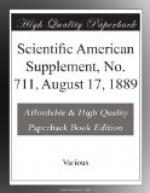There can be little doubt that if the people had sufficient intelligence and moral strength to taboo tobacco, this comparatively senseless outgo would be largely devoted to supplying these and other necessities of an exalted health status.
Tobacco injures health through its moral effects. The tobacco habit is certainly a dirty and frequently a disgusting habit, and encourages other dirty practices. Its use tends to make men cowardly, irritable in temper, and low in spirits. It blunts ideas of purity and courtesy, leading to invasion of the rights of others. It is presumed that few medical men would visit a delicate, sensitive patient after saturation with the “fragrant” effluvia of onions, but thousands whose systems are saturated with nicotine and who reek with nauseating odor do not hesitate to inflict their presence on sick or well. The time will come when the tobacco user will not be allowed to poison the atmosphere that is the common property of the public—will not be allowed to force the inhalation of nicotine upon the general public, to say nothing of being allowed to poison the infants and women in his own family. What would be said of a man who introduced poison in any degree into the food or drink of his child? Is the poisoning of the household atmosphere by the ignorant, thoughtless, or selfish smoker morally more defensible? Tobacco injures health through hereditary influence. The tobacco user begets, more certainly than the non-user, puny children with disordered nervous conditions. Luckily for our race, the women, who have the most important prenatal influence in guarding its physical well-being, are practically non-users of the plant. The general health status of the race is improving, not because the use of tobacco or the indulgence in other questionable practices is harmless, but because, among other things, of the great advance in general intelligence and knowledge of hygienic law.
A person, or the public in general, may practice an injurious habit, and yet more than counteract its influence by opposing beneficial practices.
Horace Greeley said, “Show me a drunkard who does not use tobacco, and I will show you a white blackbird.” In this country, where dietetic drinking habits are not common in the family, the weakening of moral fiber by indulgence in tobacco is usually the introduction into the round of vicious indulgences, and thus directly or indirectly affects health. Smoking induces dryness of the mucous membrane of the mouth and consequent thirst. The partially paralyzed nerve terminals want something more stimulating than water to afford relief. Furthermore, blunted appetite induces deficient nutrition, and consequently there is a call for some “pick-me-up;” hence we find that the use of tobacco tends to the habitual use of alcoholic beverages, and there are very few habitual users of alcohol who escape without structural injuries to the body as well as perversion of its functions. Decrease of vital activity




